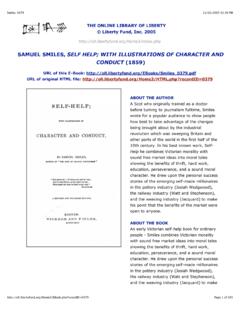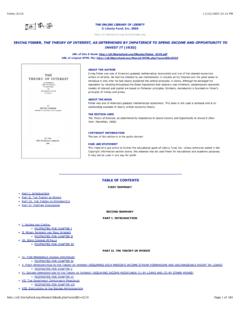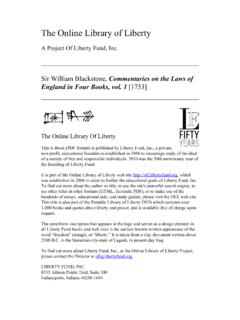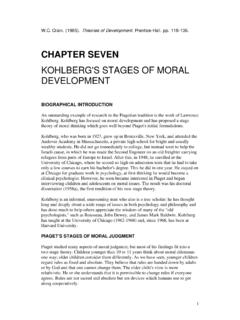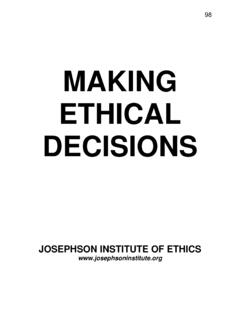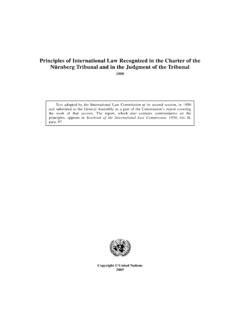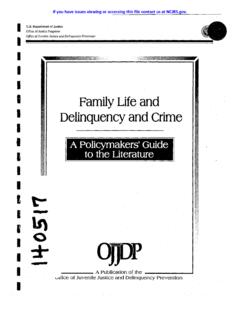Transcription of NICOMACHEAN ETHICS - Liberty Fund
1 THE NICOMACHEAN ETHICS OF ARISTOTLE THE: NICOMACHEAN ETHICS OF ARISTOTLE TRASSLA'FED BY F. H. PETERS, FKLLOW OF UKlV&BLIIR OLLKQK, OXFORD FIFTH EDITION crad adapted Lo Bywater a LONDON XEGAN PAUL, TBENOH, TBUBNER k UO., Lk 1893 PREFACE TO THE FIFTH EDITION. MANY more or less important alterations have been made in this translation, which was first published in 1881, new editions have from time to time been called for. The present edition in particular has been revised throughout, and brought into accordance with Bywater s text (Oxford, ISSO), which is coming to be recognized, not in Oxford only, aa the received text of the NICOMACHEAN ETHICS . I wish gratefully to acknowledge the debt which, in common with all lovers of Aristotle, I owe to Mr, Bywater, both for his edition and for his Contributions to the Textual Criticism of the NICOMACHEAN ETHICS (Oxford, 1892). To Mr. Stewart also I wish to express my grati- tude, not only for much assistance derived from his admirable Notes on the NICOMACHEAN ETHICS (Oxford, l892), but also for much kindly and helpful criticism in that work and in a review of my first edition (Mind, July, 1881).
2 My old friends Mr. In the few paseagee where this text is not followed, the reading adopted is indicated in a note. vi PREFACE. A. C. Bradley and Mr. J. Cook Wilson (Professors now at Glasgow and Oxford respectively) will allow me to repeat my thanks for the valuable help they gave me when the first edition was passing through the press. To Mr. F. H. Hall of Oriel, and Mr. L. A. Selby Bigge of my own College, I am indebted for some corrections in a subsequent edition. To other translators and commentators I am aIso under inany obligations, which I can only acknowledge in general terms. When I have inserted in the text explanatory words of my own, I have enclosed them in square brackets thus [ 3. A short Index of leading terms and proper names has been added to this edition (in preparing which I have found Mr. Bywater s Index of the greatest service). This Index makes no pre tension to completeness or anything approaching to completeness (except in regard to proper names).]
3 Its aim is merely, in conjunction with the Table of Contents, to help the reader to find the more im- portant passages bearing on the questions in which he may be specially interested. F. H. PETERS. OXFOSU, May, 1893. CONSPECTUS. __3c BOOK Of the good or the end .. I. Of moral virtue in general .. 11. Of the mill .. 111. 1-5. Of the several moral virtues and vices Of the intellectual virtues .. i-1. Of forms of moral character other than virtue .. 111. 6-enrl of v- or vice .. VII. 1-10. First account of pleasure .. VII. 11-cad. Of friendship or love .. VIII. and IX Second account of pleasure .. X. 1-5. Conclusion .. X. 6-end. TABLE OF CONTENTS. BOOK L THE ENU. CAIP. 1. In all he doee man seeks some good aa end or means .. 2. Tire end is the good; our subject is this and its scionce, Politics .. 3. Exactness nor permitted by subject, nor to be expected by 4. Men agree that the good is happiness, but differ as to what We must rmu from facta accepted without The pod cannot be pleasure, aa some hold, nor honour, nor virtue.
4 Various arguments to show against the Platnni4s that there cunnot be one universe1 gd: even if there were it would not help UB here .. 7. The good is the final end, and happineae is thia To find it we wk, What is man s funotion 7 Besolting definition of happineaa .. 8. Thie view harmonizes various current views .. 9. la happiness acquired, or the gift of Gode or chance? .. 10. Cannomanbecnlledhnppyduringliie? .. 11. Cannot the fortmea of aurvivora affect the dead 7 .. student, who needs experience and trniniiig question by the man of trained character .. this is.. 6. 6. PAGl 1 2 3 5 6 8 12 18 22 23 27 12. Happiness BB absolute end ia above praise .. 28 13. Division of the faculties and resulting division of the virtucs 30 X TABLE OF CONTENTS. BOOK IL NORAL VIRTUE. 1. moral virtne ia acquired by the repetition OF the corre- sponding acta .. 3. These acts must be such as reaeon prescribes : they cannot be defined exactly. but must be neither too much nor too little.
5 3. Virtue is in various way8 concerned with pleasure and pain .. 4. The conditions of virtuons action &B distinct from artistic production .. 5. Virtue not an emotion, nor u faculty, but a trained faculty or habit .. 6. Viz. the habit OF choosing the mean .. 7. This must he applied to the several virtues .. 8. The two vicious estremes are opposed to one another and to the intermediate virtne .. 8. The mean is hard to hit, and is a mntter of perception not ofreasoning .. CHAP. PACE 34 56 38 41 42 43 48 52 55 CIUETEBS 1-6. THE WILL 1. An act is involuntary when done (a) under compulsion, or (b) through ignorance : (a)means not originated by doer, (b) means through ignorance of the circumstances: voluntary, then, means originated with knowledge of cimumstancee .. 58 2. Purpose, a mode of will, means choice after deliberation .. 66 . 3. We deliberate on whst we can do-not on ends, but means 68 . 4. We wish for the end, the real or apparent good.
6 72 . 6. Virtue and vice are dike voluntary : our acts are oar own ; for we are punished for them : ignomnce is no excuee when dne to negliligence : if this be our chemcter, we have made it by repeated acta : even bodily vices are blelu- able when thus formed. We cannot plend that our TABLE OF CONTENTS . xi CRAF . PAQZ notion of good depends on our nature: for (1) vice would still be as voluntary ria virtue. (2) we help to make our- selves what we are .. 74 CHAPTERS 6-12 . THE SEVERAL moral VIRTUES AND VICES . 6 . Of courage and the opposite vices .. 80 7 . Of coursg+mi!inued .. 82 8 . Of murage improperly EO called .. 85 Q . How courage involves both pain and pleasure .. 89 10 . Of temperance .. 91 11 . Of temperance-continual .. 93 12 . Eow profiigaey ia more voluntary than cowardice .. 96 BOOK IV . THE . 1 . bf liberality .. 2 . Of magnibence .. 3 . Of high-mindednesa .. 4 . Of a similar virtue in smaller matters 5 . Of gentleneaa.
7 6 . Of agreeableness .. 7 . Of truthfulness .. 8 . Of wittiness .. 9 . Of the feeling of ahame .. 99 .. 108 .. 113 .. 120 .. 122 .. 125 .. 127 .. 131 .. 133 BOOK V . THE BAME-Concluded . JUSTICE . 1 . Preliminary . Two sew of justice distinguished . of juatioe (1) = obedienm to hw . = oomplete virtue 8 . Of judice (2) = fairneq how related to jaetioe (1) . "hat ia just in distribution dietinpished from whet i~ just in correction .. 140 .. 136 xii TABLE OF CONTENTS. CAAP. 3. Of what is just in distribution, and ita role of geometrical propor tion .. 4. Of what is just incorrection, and ita rule of arithmetical propor tion .. 6. Saple requital M not identical with what is just, but pro- portionate requital is what is just in exchauge: and thia is effected by means of money. We can now give a general definition of joetice (2) .. 6. (It M possible to act unjustly without being unjust.) That whicb is just in the strict sew is between citizens only, for it implies law.
8 7. It L in part natural, in part oonventional .. 8. The internal conditions of a jast or unjust action, and of a just or unjust agent .. 9. Bundry questions about doing and suffering injustice .. 10. Of equity .. 11. Can a man wrong himself 7 .. 1. 1 a. 9. 4. 6. 6. 7. 8. BOOK VI. THE INTELLECTUAL VIBTUEB. Mnst be studied because (a) reason preacribea the mean, @) they are a part of human excellence. The intel- lect M (1 ) acientific, (2) calculative : we want the virtue of each .. The function of the intellect, both in practice and specula- tion, is to attain truth .. Of the five modes of attaining truth: (1) of demonstrative science of thing unalterable .. Of knowledge of things alterable, viz. (2) of art in what we make .. And (3)of prudence in what we do, the virtue of the calcula- tive intellect .. (4) Of intuitive TeBSOn aa the baais of demonstrative eaienw (5) Of wiedom as the anion of scieuw and intuitive reason. Cornpieon of the two intellectual virtuee, wisdom and prudence.
9 Prudence compared with utateBmanehip and other forma of knowledge .. PAGE 144 147 152 160 163 165 169 174 176 160 182 184 185 186 ins 190 192 .. TABLE OF CONTENTB. Xlll CUAF. rAes .O. Of deliberation .. 195 10. Of intelligence .. 198 11. Of judgment. Of remon or intuitive perception BB the baais of the practical intellect .. 199 12. How prudence is related to clevernees .. 202 13. How prudence ia reloted to mod virtue .. 295 Of the nees of wisdom and prudence. BOOK VIL 1. 2. 3. 4. 5. 6. 7. 8. 9. 10. 11. 12. 18. 14. CHAPTICRE 1-10. CHARACTERS OTHER THAN VIRTUE AND VICE. Of continence and incontinence, heroic virtue and brutality. Of method. Statement of opinions about mntinenoe Etatement of di5cul ties aa tu how one am kuow right and do wrong .. Solution: to know han many sensa; in what senee such a man ~OWS .. Of incontinence in the strict and in the metaphorical mum Of incontinence in respect of brutal or morbid appetites .. Incontinence in linger less blamed than in appetite kinds of incontinence, the hasty and the weak.
10 Inwntinence yields tu pleasure, softness to pain. Two Incontinence compared with vim and virtue .. Continence and incontinence not identical with keeping and breaking a reaolution .. Prudenco is not, but cleverness is. compatible with in- continence .. CEA~ 11-14. PLEA5 UBE. Wo mud now diecnss'pleasnre, Opinions shot it .. Answers to arguments against goodnees of pleWUre. Ambiguity of good and pleasant. Pleaanre not a tra- sition, but unimpeded aotivity .. Plesenre is good, and the plewure that consists in the highest activity is ltrs good, All admit that happinem is pleseant. Bodily pleamum not the only pleasum of the bodily pleasures, and the dintinction between natur- ally and accidentally pleasant .. 208 210 214 220 224 227 230 233 235 237 259 240 243 246 THE NICOMACHEAN ETHICS OF ARISTOTLE. BOOK I. THE EhD. 1 1. EVERY art and every kind of inquiry, and like- In an lie dou man seelrf wiqe every act and purpose, seems to aim at sorne;z&C good : and so it has been well said that the good is mram.
